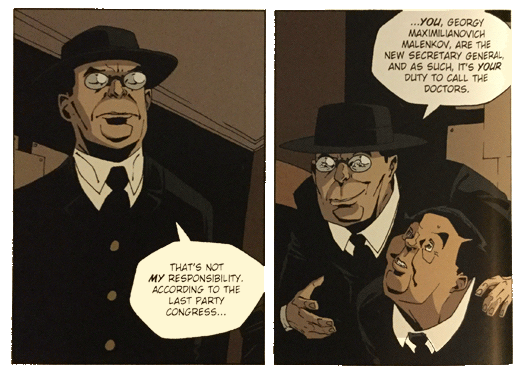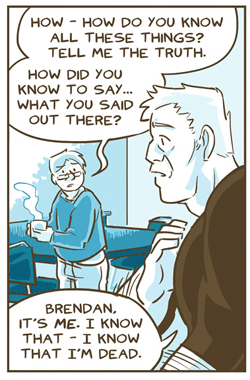

| August 2018 |
|
| Fabien Nury & Thierry Robin: The Death of Stalin | |
 Yes, I know it’s a movie too; the movie is based on this French graphic novel.
Yes, I know it’s a movie too; the movie is based on this French graphic novel.
At the beginning there’s a creators’ note: the authors say that it’s a work of fiction— but that “their imaginations were scarcely stretched” in making it. The real events were that bizarre.
The Death of Stalin is a horror story; also a comedy. It’s about terrible things and terrible people that twist around so much that they make unintentional, gruesome humor.
Totalitarianism, of both the left and right varieties, is a world built on power and fear. The opening anecdote gives some of the flavor: One cold night in 1953, Radio Moscow broadcasts a performance of Mozart. Stalin is listening, and asks for a recording. Only... there was no recording; it was just a live broadcast. The director sees only one solution: keep everyone in the building— by force if necessary— and record it again. The soloist refuses to perform— but she can be bought. The conductor is too nervous to conduct— but another one can be fetched by the police in the middle of the night. The recording is made.
And then, Stalin ups and has a heart attack. It puts everyone in a dreadful situation.
The focus shifts to the Central Committee— itself a microcosm of the country’s state of terror. Stalin is still alive, but they can’t call a doctor until they hold a proper committee meeting. They can’t get a good doctor because Stalin just sent all the best doctors to the Gulag. The committee members are scared to even touch the leader— and kind of disgusted that he pissed his pants— but already they’re thinking about who’s going to emerge as the new leader.
Beria, shown above, head of the secret police, is the early favorite. He has the necessary ruthlessness, the sang-froid, the sheer evil. (When he gets the call from Stalin’s dacha, he’s busy raping a prisoner.) And he has files on all his colleagues. And he does get the #2 spot— under Malenkov, who he is likely to be able to control.
OK, spoiler alert... well, you already know, or should, that Khrushchev emerged on top. Beria was arrested just three months after Stalin’s death, and executed at the end of the year. Even in a system organized around ruthlessness, it’s dangerous to have no friends.
All this makes a great story— it’d probably be hard to mess up— but Nury & Robin do it very well. They don’t downplay the horror, and they are certainly not making jokes, but they also find the rich vein of dark humor in the situation. (E.g., Stalin’s son— who is a piece of work, deserving no sympathy— comes to the dacha and asks where his father is, not knowing that he’s already dead. He’s in the garage, he’s told. So he goes to the garage, only to find that that’s where the autopsy is taking place...)
The art is excellent— lightly stylized, in somber colors, grand when it needs to be. (It manages to make even the frequent Central Committee meetings lively.)
If there’s anything to complain of, it’s that there’s no heroes in the story, and barely anyone sympathetic, besides some of the victims. The closest is the soloist from the Mozart concerto, and even she comes off as vindictive, though she has good reason to be so.
I’d draw some political lessons, but surely they’re obvious... with great, unbounded power comes great clownishness. Someday they’ll make a movie about Trump’s White House— in the worst case, it’ll be made by the sentient cockroaches who survive us— and it’ll be similarly horrible and horribly comic.
| Blue Delliquanti: O Human Star | |
 This started as a web comic back in 2012, and two volumes are now available in print. I devoured these quickly, then checked out the website in order to read the next chapter.
This started as a web comic back in 2012, and two volumes are now available in print. I devoured these quickly, then checked out the website in order to read the next chapter.
The basic idea: middle-aged nerdy Alastair Sterling, a pioneer in robotics, wakes up from a dream of his death. He quickly learns that he is dead and has been for 16 years— and he’s just been reincarnated in robotic form.
He goes to see his old partner, Brendan. Brendan is at first suspicious— as you might be when a robotic form of your dead partner shows up at your door. But the resemblance is too uncanny, and he lets him in. He also introduces him to Sulla, who turns out to be another robotic representation of Alastair— only one that’s turned out to be a young woman.
The story is told with multiple flashbacks, and in one of them we learn that Brendan was Alastair’s first employee, and largely supplied the business sense that has since made it into a huge business— and also that the two became lovers.
So there’s a lot of feelings to work out, and thoughts on what it means to have robots who could take on your entire personality, and whether you might prefer to be orthohuman or synthetic. Though this particular deck is somewhat stacked: robots are pretty much superheroes— Sulla can even fly. The one downside is that the only thing they can eat is sugar.
There's a nice subplot about Sulla’s extremely awkward attempts to make friends with kids her age. Though this explicitly deals with trans issues (the boy she falls for is trans), it also covertly deals with identity issues, as apparently humans are not very accepting of robots.
I really enjoyed the stories as I read them, but reflecting on them, two things bug me. One is that the issues of developing sentience are so quickly glossed over. It’s presented as an easy process, one two guys in a lab can wrangle out. I know, this is a trope in every creating-sentience story ever, going back to R.U.R. and Frankenstein. But it skips over, and trivializes, a bunch of scientific and philosophical problems. E.g. what’s the status of the not-quite-there prototypes along the way? What distinguishes a sentient robot from a toaster? What approaches to AI will pay off? If you skip right to sentience, it’s hard to avoid retelling R.U.R. (the fight for robot rights) or Overwatch (the happy transhuman future).
The other issue is tempo. Long-form fictions are great, but there’s something to be said for stories that fit within a single book. After two volumes, everyone’s forgotten the big mystery of who created New Alastair, and Sulla hasn’t even asked her crush for a date. Maybe this is how G.R.R. Martin fans feel. So, if you’re frustrated by uncompleted stories, you may have to wait a few years more.
Anyway, though there’s plenty of speculations about robots and transhumanism, it seems to be mostly shaping up as a story about (queer) relationships, change, and acceptance.
